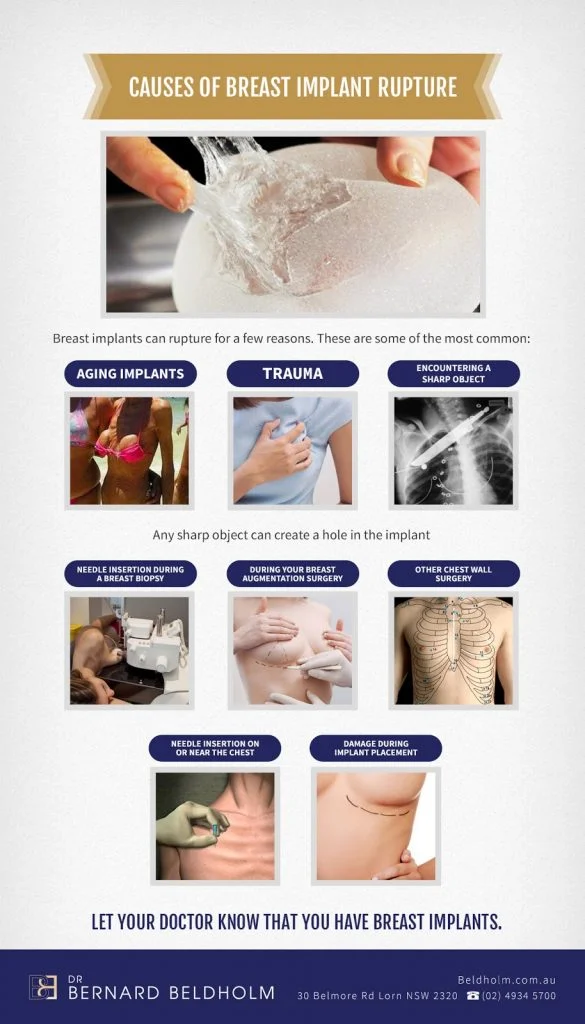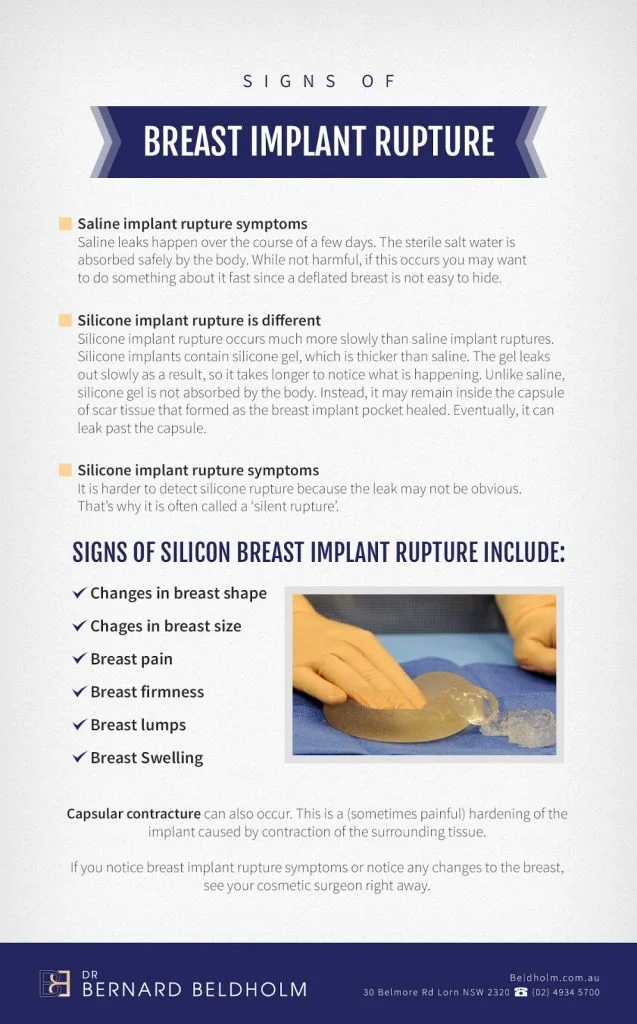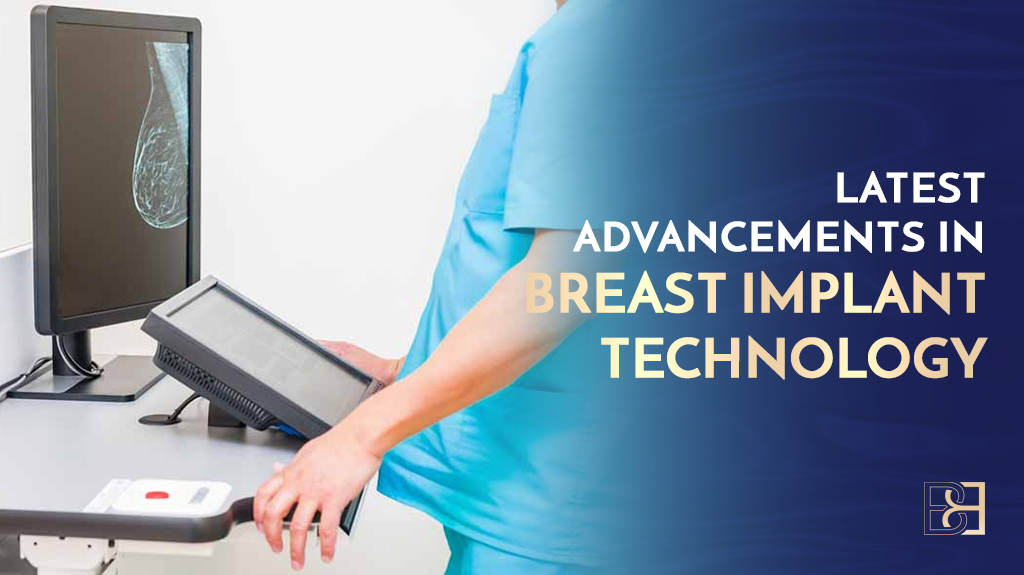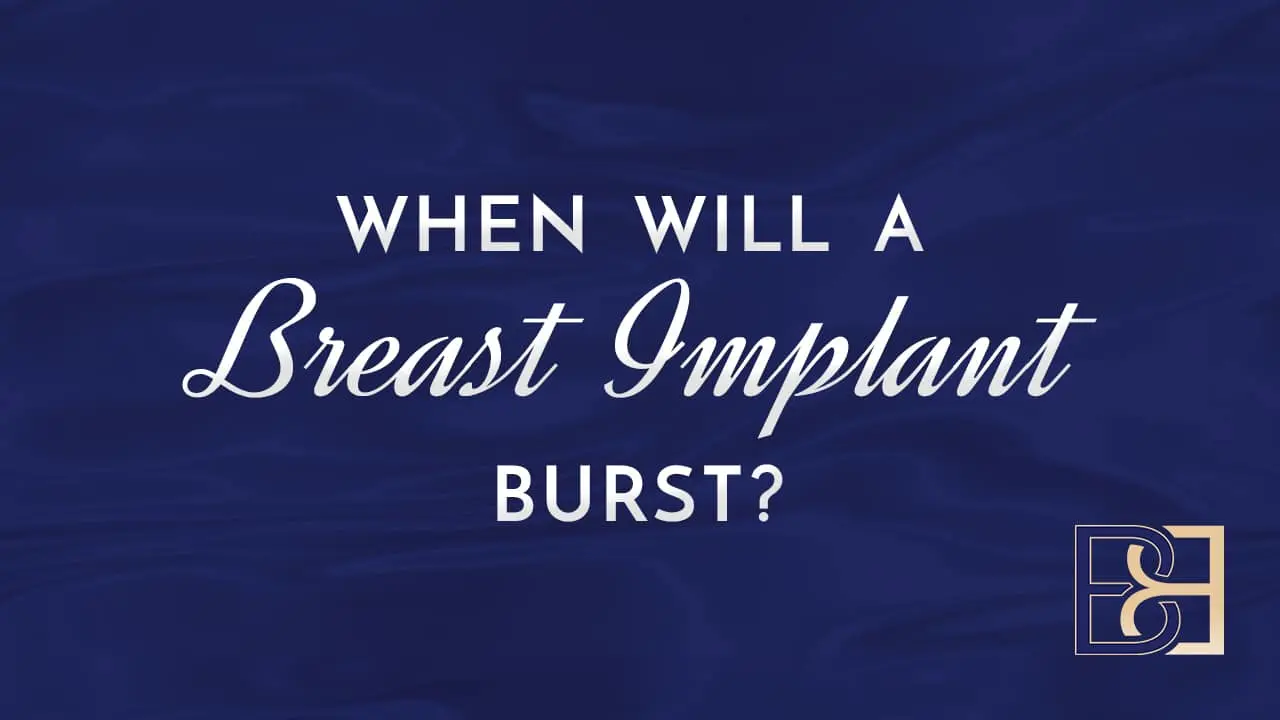The thought of breast implants bursting is a scary thought. An implant tear or hole is called a rupture. Sometimes, a ruptured breast implant occurs in the first few months, but the longer you have implants, the more likely rupture becomes.
Causes of breast implant rupture
Breast implants can rupture for a few reasons. These are some of the most common:

Aging implants
Implants are not lifetime devices. As breast implants age, the silicone shell can weaken. This makes a tear or hole more likely. Keep in mind that the implant shell is made of silicone whether you have silicone or saline breast implants.
Trauma
Accidents happen. If you suffer an injury to your chest, it is possible to create a hole or rip in the implant. A car accident is one of the most common traumas that lead to implant rupture, although just because you have had an accident or chest injury, does not always mean the implant is damaged. Still, it’s wise to get them checked with an MRI if you have injured your breasts in an accident. It takes about 30 kilograms of weight dropped from waist level to cause a breast implant burst.
Encountering a sharp object
Any sharp object can create a hole in the implant. Needle insertion during a biopsy is one possible cause. Another example would be during surgery. If you are having a surgery, biopsy, or needle insertion on or near the chest, let your doctor know that you have breast implants
Damage during implant placement
It is possible for breast implants to rip or tear during breast augmentation. No one wants obvious surgery scars. One way of minimizing breast implants scars is to create a small surgical incision. For silicone implants with an inframammary incision, the incision will be about 6 cm long, for example. The breast implant must be pushed through the opening and placed in the dissected pocket. Surgical tools can sometimes tear the implant. This is the main reason for early implant rupture.
Download our guide: “How to Choose a Breast Implant”
Signs of breast implant rupture
Breast implant rupture symptoms can be obvious when you have saline breast implants. Silicone implants may be less noticeable. These are the symptoms to watch out for.

Saline implant rupture symptoms
Saline implants contain sterile salt water in a silicone shell. The surgeon fills the implant with the salt water solution during surgery, then the implant valve is closed. If the valve fails at some point, or if the silicone shell tear, things can go downhill **. I mean that literally — in the sense that the non-toxic saline leaks out fast and the breast visibly deflates. This happens over the course of a few days. The sterile salt water is absorbed ** by the body. While not harmful, if this occurs you may want to do something about it fast since a deflated breast is not ** to hide.
Silicone implant rupture is different
Silicone implant rupture occurs much more slowly than saline implant ruptures. Silicone implants contain silicone gel, which is thicker than saline. The gel leaks out slowly as a result, so it takes longer to notice what is happening. Unlike saline, silicone gel is not absorbed by the body. Instead, it may remain inside the capsule of scar tissue that formed as the breast implant pocket healed. Eventually, it can leak past the capsule.
Prior to 1992 in Australia, liquid silicone was used in breast implants. This style implant was more prone to leak beyond the capsule into the lungs and lymph nodes, for example. This causes more scar tissue to form, which may result in discomfort or changes in breast shape. Silicone granulomas, which are lumps of silicone, could develop in the breasts or elsewhere in the body as a result.
If you had implants after 1992 in Australia, there is less need to worry about this. The reason? Manufacturers switched to implants with thicker silicone gel and thicker shells. A silicone gel ‘fracture’ is still possible, but it is less likely than the older style of implant. Plus, the gel tends to stay inside the breast implant capsule for longer, making removal of the material easier. This also allows more time for detection by routine screening.
Silicone implant rupture symptoms
It is harder to detect silicone rupture because the leak may not be obvious. That’s why it is often called a ‘silent rupture’.
Signs of implant rupture include changes in breast shape and size, pain, firmness or lumps, and swelling. Capsular contracture can also occur. This is a (sometimes painful) hardening of the implant caused by contraction of the surrounding tissue. This squeezes the implant and can distort the shape. There are several stages of capsular contracture. It tends to worsen with time.
If you notice breast implant rupture symptoms or notice any changes to the breast, see your cosmetic surgeon right away.
Preventing implant rupture
Breast implants are very durable. However, they are not made of steel and they can be damaged due to aging or injury. Here are some tips for preventing and monitoring for implant rupture.
** first
Don’t partake in activities that can damage your breast implants if possible. While you can exercise and do normal-to-strenuous activities once you are fully healed from surgery, it is wise to treat your implants with care.
Everyone’s level of physical activity is different. For example, if you are a pro wrestler, you breast implants are more susceptible to damage than someone who works in an office all day. Either way, if you are involved in activities that can cause trauma to the chest, it is essential to monitor your breasts for changes.
Most people don’t have anything to worry about with normal fitness activities, but it is better to be ** than sorry and get them screened regularly. This is your health we are talking about, after all.
Can a breast implant burst?
Watch this YouTube video to find out what happens when Doctor Bernard attempts to burst a breast implant! If you had any doubt about how durable are breast implants or can you exercise with breast implants, this video should lay your fears to rest.
How often should you replace breast implants?
It’s a myth that you have to get breast implants replaced every 10 or 15 years. Most implants can last beyond this timeframe, especially modern ones. It is even possible to get decades of life out of an implant, but there are no guarantees on how long a pair of implants will last.
You do not need to get implants replaced unless they are problematic. Lifelong screening with an MRI should be part of your health care routine every two years to scan for problems. As long as you have implants, you should continue getting them screened. If you are happy with them and they are not leaking or damaged, you can keep the implants in.
Bear in mind that implants typically don’t last a lifetime. Aging and wear and tear can degrade the implant over time, resulting in a leak. That is why monitoring is so important.
MRI for implant rupture
While you can’t always prevent accidents, there are steps you can take to monitor your implants for rupture. MRI screening is recommended by the FDA three years after the implants are placed, and then again every two years after that. Health insurance is unlikely to cover this, so you may have to pay out of pocket.
Silicone breast rupture is not always obvious. You may not be able to detect it right away. That is why it is important to stay on top of things. For more facts on what to look for, check out this link from BreastCancer.org. https://www.breastcancer.org/treatment/surgery/reconstruction/corrective/implant-rupture
While MRI screening is the most accurate way to detect leaking implants, it is not foolproof. It is possible that the rupture might not show up. Likewise, an intact implant could appear ruptured on the MRI. If you suspect the results are incorrect, seek additional testing or a second opinion.
Get a different kind of implant all together
If you are concerned about breast implant rupture, there is another kind of breast augmentation to consider. You can increase breasts about one cup size using your own body fat. This nixes many of the complications that can sometimes occur with other kinds of implants. While most patients opt for traditional silicone or saline implants, Doctor Bernard will be happy to discuss this with you if you are interested.
There are two stages of breast implant rupture
The two types are known as intracapsular rupture and extra capsular rupture. This occurs in stages, starting with IC rupture first.
Intracapsular breast implant rupture
When a breast implant bursts or tears, it begins to leak into the implant capsule that your body created as it healed from surgery. This is called an intracapsular rupture (IC). The capsule forms to seal the foreign object off from the rest of your body. Capsule formation is a natural immune response to the foreign object.In theory, the capsule works to encase the leak. However, it is difficult to know that there has been a leak in this case. The implant often looks and feels like normal breast tissue at this stage. That is why screening is so important. Many women become aware of a leak on an ultrasound for unrelated breast issues, although ultrasounds have a high false positive rate. Implant folds (which are normal) can appear like leaks. An MRI can confirm the result.
Extracapsular. Breast implant rupture
Extracapsular rupture (EC) is when the silicone has leaked beyond the implant capsule. It is diagnosable with an ultrasound. The patient may notice pain, lumps, discomfort, and other symptoms, but it could also be silent, much like an IC rupture.
How is a ruptured implant treated?
Once a breast implant rupture has been confirmed, treatment is the next step.
Getting them removed
A leaking implant should be removed surgically. It’s standard practice to remove both implants, even if only one is found to be leaking, especially if implant age is the cause. Silicone that has leaked beyond the capsule, and even the capsule itself, may also be removed as needed.
This doesn’t mean you have to live without breasts. You can decide to have the implants replaced during the same surgery. You and your surgeon should discuss if you want to keep the same type of implant or switch to a different kind.
If you don’t want to replace the implants, you may need a breast lift or other corrective breast surgery.
Should you get leaking breast implant removed right away?
The benefit to removing leaking breasts implants ** is that an IC rupture is easier to remove than an EC rupture. The surgery is less invasive, which often means a faster recovery.
If you wait, it could turn into an EC rupture. If silicone has leaked beyond the capsule into the breast tissue or nearby areas, it is possible that not all of it will be removed. EC removal causes more tissue trauma than treating an IC rupture.
If you leave the ruptured implants in, this is what happens
An IC rupture can turn into an EC rupture. Leaking silicone can invade breast tissue and the chest wall or other areas. Scar tissue is likely to develop, which is your body’s natural response to control the leak. This can be irritating and may also cause the implant to feel hard and tight. In the most severe cases, silicone can even leak out through the skin.
Can you get sick or die from a ruptured implant?
Ruptured implant have not been linked to reproductive problems or breast cancer, but it is likely to cause swelling, irritation, lumps, and scar tissue. Silicone is one of the ** materials on earth, and sterile salt water will be ** absorbed by the body. However, leaking silicone can also obscure breast cancer screenings, which is a major concern.
Still, you can choose to leave the ruptured breast implant in, but likely with a poor aesthetic outcome for the breast itself. Capsular contracture and silicomas (silicone lumps) may form, and breast screening will be less effective. Discomfort and pain may result. You should remove or replace leaking implants as soon as possible.




